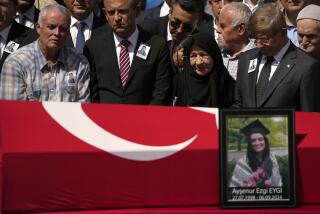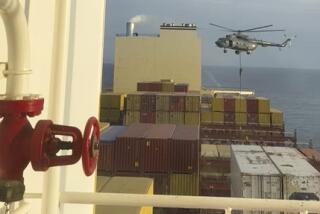Israel flotilla raid deals a blow to ties with Turkey
- Share via
Reporting from Moscow — Turkey, a longtime ally of Israel, recalls its ambassador and calls off joint military exercises as Turks take to the streets in protest. Ties had been deteriorating since the Gaza assault in 2008-09.
Israel’s raid on an aid flotilla that sailed out of Turkey may have eviscerated, at least for the foreseeable future, any lingering remnants of goodwill among the political elite of Turkey — a country long prized by the Jewish state as its most stalwart Muslim ally.
Turkey yanked its ambassador from Israel in protest Monday and backed out of joint military exercises. As demonstrators took to the streets to demand revenge, Turkish leaders unleashed fiery rhetoric against Israel.
“It should be known that we are not going to remain silent in the face of this inhumane state terrorism,” Prime Minister Recep Tayyip Erdogan said. He denied Israeli allegations that there were weapons onboard, saying the ships were carefully screened.
At the United Nations, Turkish Foreign Minister Ahmet Davutoglu called Monday “a black day in the history of humanity.” Turkey demanded Israel apologize and return the bodies of the dead — most believed to be Turkish — as well as the wounded to their homelands.
Davutoglu also called for an investigation into the raid, saying Israel has “suffocated” the peace process by raiding the flotilla, which had been headed to the Gaza Strip.
“Humanity drowned in the international waters of the Mediterranean,” he said.
Ties between Turkey and Israel, forged during Cold War and strengthened by mutual convenience, had been deteriorating long before Monday’s bloodshed.
Israel has been leery of Turkey’s ruling Justice and Development Party, fearing it may pull Turkey toward Islamism. Suspicion was particularly intense in 2006, when Turkey hosted exiled Hamas political leader Khaled Meshaal.
For Turkey’s part, the Israeli friendship was becoming more expensive in domestic political capital as Turks, along with the rest of the Muslim world, recoiled from the ongoing occupation of Palestinian territories and the blockade of Gaza.
Turkey had long viewed its ties to Israel as proof of its diplomatic clout. Ankara believed, with some justification, that it could capitalize on Israel’s tight relationship with the United States to gain U.S. backing — or at least deflect American opposition — for Turkey’s position on the controversial historical questions of Cyprus and the Armenian genocide.
But as Turkey began to enjoy a sense of renewed strength, it began to talk directly with Armenians and Greeks and to forge closer ties with the Arab world.
Then, in 2009, shortly after Israel’s assault on Gaza killed about 1,400 Palestinians and laid waste to a tiny territory already devastated by poverty and violence, Erdogan electrified the Arab world with an outburst of well-timed criticism.
Sitting onstage at the World Economic Forum in Davos, Switzerland, the Turkish premier turned on Israeli President Shimon Peres, saying angrily that Peres had “killed people” before storming off the stage.
Turkey has long been outspoken against Israel’s blockade of Gaza, but the flotilla raid may be the final straw. It will probably push the two countries into a cold peace while elevating Turkey’s status in the Arab world as a strong country willing to push back against Israel.
Turkish television Monday was showing images of Palestinians in Gaza and Arabs in other countries flying the Turkish flag alongside the Palestinian flag.
“I don’t know what kind of relationship can remain after this,” said Mustafa Akyol, a prominent Turkish columnist and author. “This is every Turk I know — Islamists, secularists, nationalists, everybody. People are enraged.”
More to Read
Sign up for Essential California
The most important California stories and recommendations in your inbox every morning.
You may occasionally receive promotional content from the Los Angeles Times.










